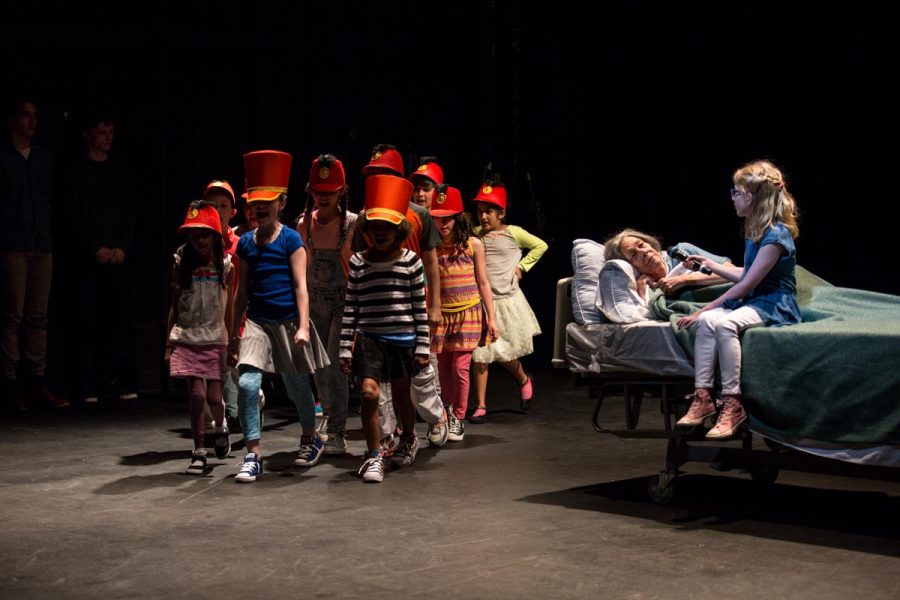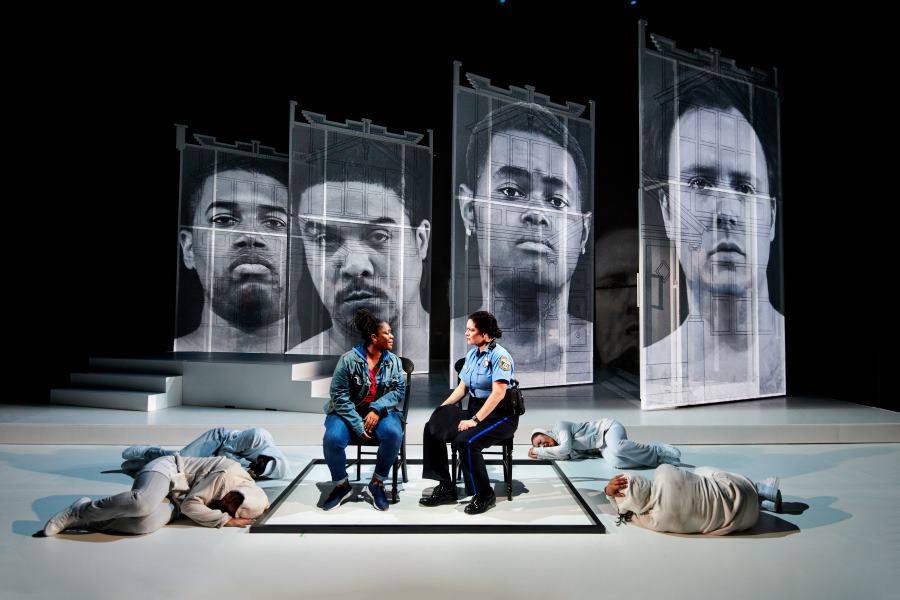It was my first day at the Philadelphia Fringe Festival and I was in someone’s apartment. It was in an up-and-coming neighborhood on the waterfront with a clear-yet-delightful name: Fishtown. I was being commanded to laugh.
“Even if it’s fake, you’ll still get the benefits,” performer Alexandra Tatarsky told the audience. Those benefits being destressing, tension-relieving, “and it’s really good for core strength,” she says. Tatarsky called the exercise “laughter yoga.” So I did. She told me to laugh and pretend cry; I did. Laugh and pretend vomit; I did. Laugh and scream; I did, loudly.
It was halfway through Tatarsky’s one-woman show Americana Psychobabble, in which she, dressed in American flag regalia and made up to look like a deranged beauty queen, opens with a series of nonsensical yet wholly American words. Sample: “Put America first! Putin America first. Putin fisting America!” It was like watching political sound bites through a funhouse mirror. The show was inspired by the Republican National Convention and “the clown’s election,” and the point seemed to be: When everything is this ridiculous, the only thing you really can do is laugh, and cry, and scream.
In fact, those things may be healthier, and more necessary, than being indifferent and numb, according to playwright Marc Bamuthi Joseph, who also had a show at the Fringe (more on that later). “We’re in a place of stunted empathy, so that impacts the political will to act,” he told me. “I think the best way to combat that is to animate one’s own beliefs and also the capacity of others to believe what they believe.” He then added: “So long as it doesn’t mean the violent destruction or limitation of other people’s access to the franchise.”

Why am I talking about politics in what is supposed to be an article about a theatre festival? Because politics has infiltrated every aspect of our lives, whether we like it or not. In 2017, the age of hyperconnectivity and 24-hour news cycles and resistance, when we turn off our phones and sit in a dark theatre, we are bringing in the baggage and headlines of the day. And if there’s anything onstage that alludes, even vaguely, to what is being discussed on CNN, our brains will naturally make that connection. It’s become almost instinctual now. And artists who want to dive directly into the political realm must balance partisanship and polemics with nuance and urgency.
Americana Psychobabble was one of 170-plus shows that was presented at the 17-day Fringe Festival in September. And while 13 of those shows were curated by the local presenting house FringeArts, around 160 were independently produced, though still presented under the Fringe moniker. In tandem, there was an all-new festival from Opera Philadelphia called Festival O (which coproduced Joseph’s piece We Shall Not Be Moved). In short, it’s huge and impossible to take it all in. I only saw eight shows over three days, and I let the staff at FringeArts make my schedule for me. Of the eight I saw, half dealt with themes in the current political zeitgeist: climate change, police brutality, racism, self-care. Sure, there was also the play I saw about a male-female friendship, and a dance piece about LGBTQ relationships. But the fact that so many of them dealt with the big political questions of 2017 didn’t seem like an accident.
It’s not as if I’m actively seeking news headlines in the art I consume. But when you have a group of angry children, as in the case of Pig Iron Theatre Company’s A Period of Animate Existence, yelling about climate change in unison, “Don’t forget my cheeks! Don’t forget my eyes! Don’t forget you ruined it all for someone half your size,” as part of a show about the Earth and mass extinction, and the performance takes place mere days after Hurricane Maria ripped through Puerto Rico, the real-world association is jarring.
Pig Iron’s extravaganza was perhaps the most high-profile event at the Fringe. With a budget of $400,000 and a massive cast of 87, as well as live musicians, three choirs, and professional wrestlers, it used original music and physical movement to explore the history of mass extinctions on Earth. Is climate change a sign that humanity is at an end, the show wondered? And if so, how do we process that scary information? Instead of a narrative storyline, it was structured in five acts; two of those acts had no people on it.
“I think of it as a pretty spiritual piece,” said Dan Rothenberg, who directed and co-created A Period of Animate Existence, in an interview before the festival. He doesn’t consider the work, which he co-conceived with composer Troy Herion and set designer Mimi Lien, to be advocacy theatre. “I don’t feel equipped to shift public opinion, and be a science educator or a policy advocate,” Rothenberg insisted. Instead, the tone of A Period of Animate Existence is contemplative. Wrestlers fight each other in beautiful tableaux representing evolution and survival of the fittest. An encapsulating line: “Something always was, something else will be, let that set you free.”
The piece felt like floating on water, instead of fighting against a current. That’s intentional, according to Rothenberg. “I just don’t know that taking a panicked tone or a hectoring tone has done anything,” he said.
The gentleness that Period of Animate Existence took with humanity’s destruction contrasted with the high emotions on display in We Shall Not Be Moved, a new opera by composer Daniel Bernard Roumain and playwright Marc Bamuthi Joseph, directed by Bill T Jones. It took as its subject the infamous MOVE fire of 1985, in which local police dropped two one-pound bombs on a house sheltering members of the Black Power group in West Philadelphia, leading to a conflagration that destroyed 61 houses in the predominantly black neighborhood and killed 11 people, including five children. The 250 residents who were displaced received very little remittance from the city government. That disgraceful event—and its resonance with today’s ongoing police brutality and racial injustice—is dramatized in the opera, which was presented at the Wilma Theater in a coproduction between Opera Philadelphia, the Apollo Theatre, and the Hackney Empire in London. (The piece runs Oct. 6-7 at the Apollo in New York City.)
We Shall Not Be Moved traces five teenagers, four black and one white, hiding out in the abandoned MOVE neighborhood. The main character, who calls herself Un/Sung (played by spoken word artist Lauren Whitehead), says: “America, what’s so wrong that you make laws against my body? Black, like not supposed to win.” Blending opera, hip-hop, and spoken word, the piece bills itself as a “hip-hopera.” It infused a dose of freshness into the opera genre, while giving a contemporary story the epic weight. Notably, it was the only piece in the curated Fringe that was created by artists of color. Even more notably, it was my favorite work at the festival. Opera as a genre is sorely lacking in black voices and stories, and We Shall Not Be Moved was a much-needed, and beautifully rendered, addition.
Around the country on the day I saw We Shall Not Be Moved, football players were kneeling in protest of police brutality (and the very right to protest at all), making the piece particularly gutting. But like Rothenberg, Joseph doesn’t consider his opera activist or prescriptive.
“My job as an artist is to make content for people that moves them, to connect them to emotions that’s about empathy more than vitriol, and compassion more than polemics,” he said. “I don’t know if there’s like, again, a politically expedient or direct path of action and shift. I think in general that we have to subscribe to our humanity.”

Weighing the results, both curated and un-, at this politically charged moment made me wonder: What role should art play in 2017? When the news feels like the world’s most grueling marathon-theatre experience, rivaling any stage drama, what can the stage bring to our consciousness that we are not already getting from CNN or the President’s Twitter account?
I posed the question to Marc Bamuthi Joseph.
“Art changes minds,” he told me. “And whatever it is, that becomes normalized in our cultural landscape, ultimately becomes the opinion that does shape policy. The burden of artists to show us the way. The narrativizing of American culture falls upon artists.” This changing of minds, and hence of culture, doesn’t happen immediately. “These changes don’t happen in a quarterly economic cycle, and they may not even happen in a four-year electoral cycle. But leading thinkers and artists always show us the way.” It’s changing public policy through steps, instead of leaps. Theatre does not command; at most it guides.
And if artists choose to respond to those big socioeconomic or environmental questions that plague all of us, they must do so carefully, and intentionally. “I don’t experience catharsis unless I’m startled into feeling more deeply than I do just reading the headlines on my phone,” wrote New York Times critic Ben Brantley in an article from August about political theatre. With that as my benchmark, I would rate Period of Animate Existence lower than Americana Psychobabble and We Shall Not Be Moved. The former, while large and awe-inspiring in its scale, left me cold emotionally, while the latter two engaged me and made me feel—the best thing theatre can do in a time threatened as much by indifference as conflict.
The programming around these shows also mattered enormously to their effectiveness. A Period of Animate Existence had a traditional presentation: a two-hour performance, no talkbacks or online resources. The audience was expected to digest the work, and the existential terror it might engender, on their own. But while I almost never stay for talkbacks, I did for We Shall Not Be Moved, which had both pre-show and post-show “community conversations” with the actors and community organizers. Considering the heady subject matter of A Period of Animate Existence, a talkback might have been helpful—I’ve been talking to everyone I know who saw the show because I needed to process it with other people.
With today’s audiences, who are more activated and awake, theatre artists would do well to take advantage of that activation. Especially if the work is trying to grapple with pressing issues that are so large that so many of us feel powerless. I don’t think it’s on artists to have solutions to the problems that they are dramatizing onstage. But at the very least they should provide audiences with resources to complement the art. If theatre is to be a guide, it should guide audiences towards answers or actions—in the work itself, in the program, or in community engagement. And in a time when protesting is the new brunch, theatre needs to make a better case for why audiences should be in a room with it. Presenting questions and issues isn’t going to cut it. Big-budget spectacle for its own sake isn’t going to cut it.
During the final talkback of We Shall Not Be Moved, an older white man in the audience asked, “How do I live with myself? What do I do?” Actor John Holiday responded: “Lead with love and light.” It sounds small, but it’s something that I’ve heard repeated. In 2017, in a world of reactionary, 140-character judgement, listening and having empathy is a radical act.
It can something be small, like laughter yoga, or larger, like introducing audiences to local advocacy organizations. But artists have a particular power in a time like this: They have the ability to bring audiences into a room, take away our phones, and hold our attention. They should make the most of that time.


